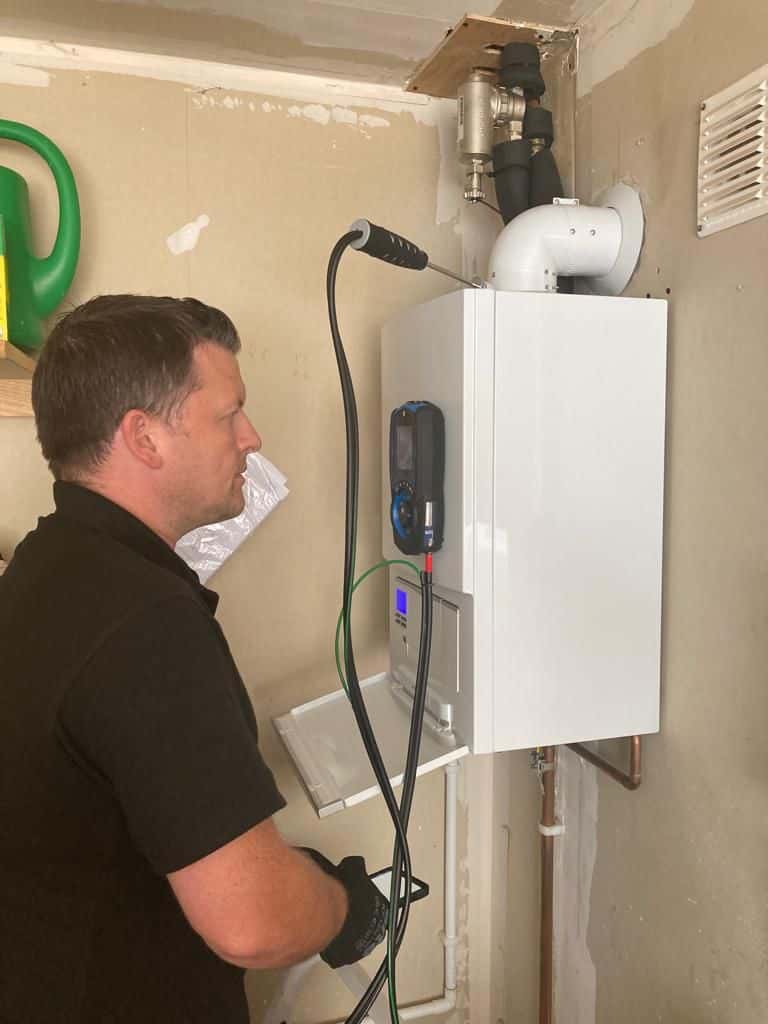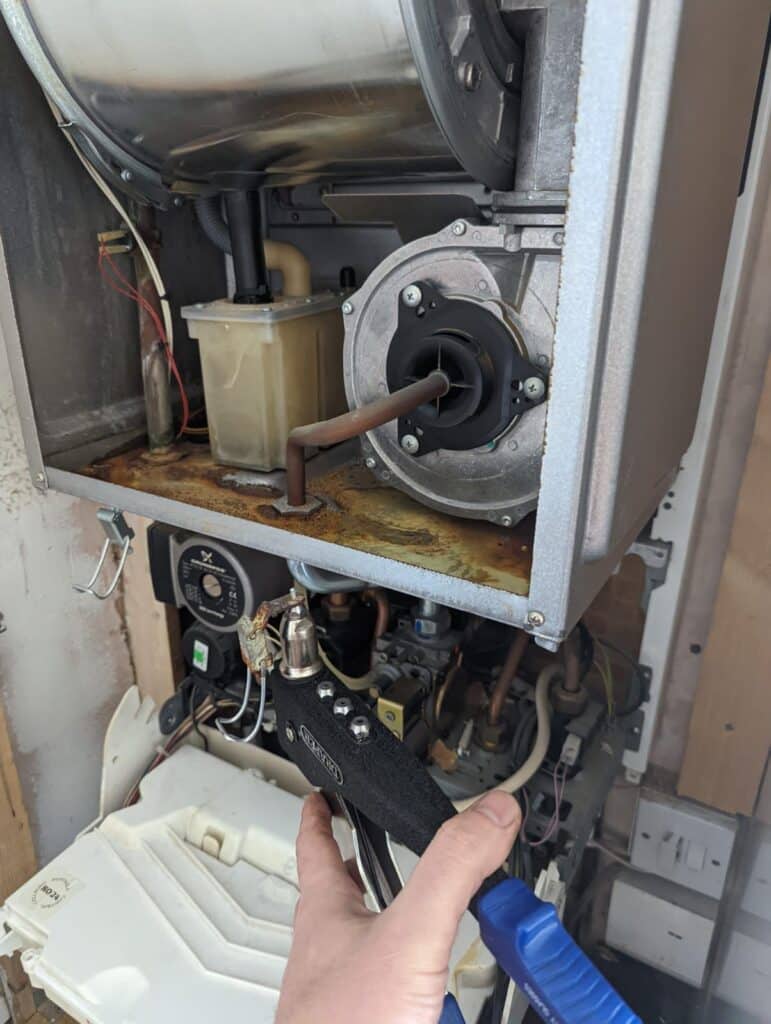You’re Safe with iSafe

In a world where convenience often takes precedence over safety, the significance of employing a Gas Safe registered engineer or company cannot be overstated. Gas, a valuable energy source powering countless homes and businesses, poses inherent risks when mishandled. This is something we unfortunately see and hear horror stories with often at iSafe. Below are compelling reasons why prioritizing the services of a Gas Safe professional is paramount. 1. Your Safety Comes First: Gas is not to be taken lightly. Incompetent handling can lead to leaks, explosions, or carbon monoxide poisoning. All of our Gas Safe engineer’s have undergone rigorous training and possess the expertise to ensure your safety by correctly installing, repairing, and maintaining your gas appliances. 2. Legal Compliance: Utilising the services of a Gas Safe registered professional ensures that you comply with legal requirements. In Scotland, it is illegal for unregistered individuals or companies to work on gas appliances. Ignoring this can result in fines or even imprisonment. Prioritising a Gas Safe engineer guarantees adherence to these essential regulations. 3. Expertise and Experience: Gas systems are complex and demand a deep understanding of both mechanics and safety protocols. Gas Safe registered engineers are extensively trained, regularly assessed, and equipped with the latest knowledge in gas safety. Their expertise ensures that your gas appliances operate efficiently, minimizing the risk of accidents. 4. Insurance and Liability: When you choose iSafe. You are choosing a Gas Safe registered company. This means you are also covered by our insurance. In the unlikely event of an accident or damage resulting from our work, you are protected. Entrusting your gas-related needs to an unregistered entity may leave you vulnerable and financially exposed. 5. Peace of Mind: Knowing that your gas appliances are in the hands of a qualified professional provides peace of mind. Our Gas Safe engineers adhere to strict safety standards, and their work is regularly reviewed. This confidence in our competence allows you to enjoy the benefits of gas appliances without constant worry about potential hazards. 6. Regular Maintenance Matters: Gas appliances, like any machinery, require regular maintenance to operate efficiently and safely. iSafe engineers are equipped to conduct thorough inspections, identify potential issues, and perform necessary maintenance. Regular check-ups not only enhance safety but also extend the lifespan of your appliances. At iSafe we would rather prevent your boiler breaking down when you need it the most. In conclusion, the decision to use a Gas Safe registered engineer or company is not just about compliance with the law; it is about prioritizing your safety and the well-being of those around you. By making this informed choice, you safeguard your property, your loved ones, and yourself from the potential dangers associated with gas appliances. Remember, when it comes to gas, expertise and safety should always be non-negotiable.
The Crucial Role of Filters in Your New Central Heating System

When it comes to the installation of a new boiler in your home, the significance of incorporating a filter into your central heating system cannot be overstated. Often overlooked, these unassuming devices play a pivotal role in enhancing the efficiency, longevity, and overall performance of your heating setup. Here’s why a filter is not just an accessory but an indispensable component for a top-tier heating system. 1. Prolonging Boiler Life: A filter acts as a frontline defender against impurities and debris circulating in your central heating system. By capturing particles like sludge, rust, and sediment, the filter prevents these contaminants from reaching your new boiler. This protective barrier ultimately extends the lifespan of your boiler by reducing wear and tear on its internal components. 2. Maximizing Efficiency: Something we focus on at iSafe is efficiency. An energy efficient heating system is synonymous with cost savings. Never has this been more prevalent as energy costs continue to rise. Filters ensure that your boiler operates at its peak efficiency by preventing the accumulation of debris that could hinder heat exchange. With a clean and unobstructed system, your boiler requires less energy to produce the desired warmth, resulting in lower energy bills and a reduced carbon footprint. 3. Preventing Radiator Blockages: Central heating systems often fall victim to the accumulation of sludge, particularly in radiators. This sludge buildup can impede the flow of hot water, leading to uneven heating and cold spots in your home. A filter intercepts these particles before they have a chance to settle, preserving the integrity of your radiators and maintaining consistent warmth throughout your living space. 4. Reducing Maintenance Costs: Filters play a crucial role in minimizing the need for extensive maintenance and repairs. By preventing the entry of contaminants into your new boiler, filters contribute to a cleaner and more reliable system. This, in turn, reduces the likelihood of breakdowns and the associated repair costs, saving you both time and money in the long run. 5. Enhancing Water Quality: The quality of water circulating through your central heating system is paramount. Filters ensure that the water remains clean and free from impurities that could compromise the effectiveness of your boiler. Improved water quality not only safeguards your heating system but also contributes to better air quality within your home. 6. Maintaining System Pressure: Unchecked debris in your central heating system can lead to pressure imbalances. A filter helps regulate system pressure by preventing blockages that could result in fluctuations. Consistent pressure ensures optimal performance, reducing the likelihood of your boiler shutting down or triggering safety features due to irregularities. 7. Sustainable Heating Practices: In an era where sustainability is at the forefront, incorporating a filter aligns with eco-friendly heating practices. By maintaining a clean and efficient system, you not only conserve energy but also reduce the environmental impact associated with frequent repairs and replacements. In conclusion, the inclusion of a filter in your central heating system is a strategic investment that pays dividends in terms of efficiency, longevity, and cost savings. When getting a new boiler installed, consider the filter as an integral component, fortifying your heating setup against the challenges of debris and contaminants. It’s not just about warmth; it’s about ensuring a sustainable, reliable, and enduring heating experience for your home.
Why Boilers Break Down When Working Hard in Cold Weather

As the Scottish winter tightens its grip, the reliable warmth provided by our boilers becomes a non-negotiable comfort. However, it’s precisely during the coldest days that these heating systems may falter, leaving us shivering in the chill. Understanding why boilers break down when working hard in cold weather can empower you to take preventive measures and ensure a cozy and uninterrupted winter. Here are the key factors at play: 1. Increased Demand and Stress: When temperatures plummet, the demand for heating rises sharply. Boilers working overtime to maintain a comfortable indoor temperature are subjected to increased stress. The constant demand for heat places strain on components, making them more susceptible to wear and potential breakdowns. 2. Frozen Pipes and Components: We see this a lot at iSafe. Cold weather brings the risk of freezing, especially in poorly insulated areas. When water within the boiler or its pipes freezes, it expands, leading to potential blockages and damage. This can result in reduced efficiency or complete system failure. 3. Inadequate Maintenance: Neglecting regular maintenance is a common culprit behind boiler breakdowns. Cold weather amplifies the strain on the system, and without proper upkeep, components may deteriorate faster. Regular servicing and inspections are crucial to identifying and addressing potential issues before they escalate. At iSafe we would much rather maintain your boiler and help prevent it breaking down when you need it most. 4. Age and Wear: Older boilers, particularly those approaching the end of their expected lifespan, are more prone to breakdowns. As components age, their efficiency declines, and the likelihood of malfunctions increases. Upgrading to a newer, more efficient model may be a wise investment to avoid winter breakdown woes. 5. Thermostat Issues: Faulty thermostats can lead to erratic heating patterns and cause the boiler to work harder than necessary. When the thermostat fails to accurately gauge the indoor temperature, the boiler may overcompensate, leading to increased wear and tear. 6. Fuel Supply Problems: In extreme cold, fuel supply issues can arise. Frozen fuel lines or disruptions in the fuel delivery system can impede the boiler’s ability to generate heat. Ensuring a stable and reliable fuel supply is crucial for preventing weather-induced breakdowns. 7. Ignition Problems: Cold weather can affect the ignition system of a boiler. Components like the pilot light or electronic ignition may struggle to function optimally in freezing conditions, leading to ignition failures and, consequently, a breakdown. 8. Pressure Fluctuations: Cold weather can cause fluctuations in water pressure within the boiler system. Low pressure can trigger malfunctions, while high pressure can damage components. Regular monitoring and adjustments are necessary to maintain the optimal pressure for smooth boiler operation. In conclusion, the vulnerability of boilers to breakdowns during cold weather is a multifaceted challenge. Vigilant maintenance, timely upgrades, and addressing issues promptly can significantly reduce the risk of winter-induced disruptions. By understanding the factors contributing to breakdowns, homeowners can take proactive measures to keep their boilers running efficiently, ensuring a warm and comfortable winter season. You’re safe with iSafe.





